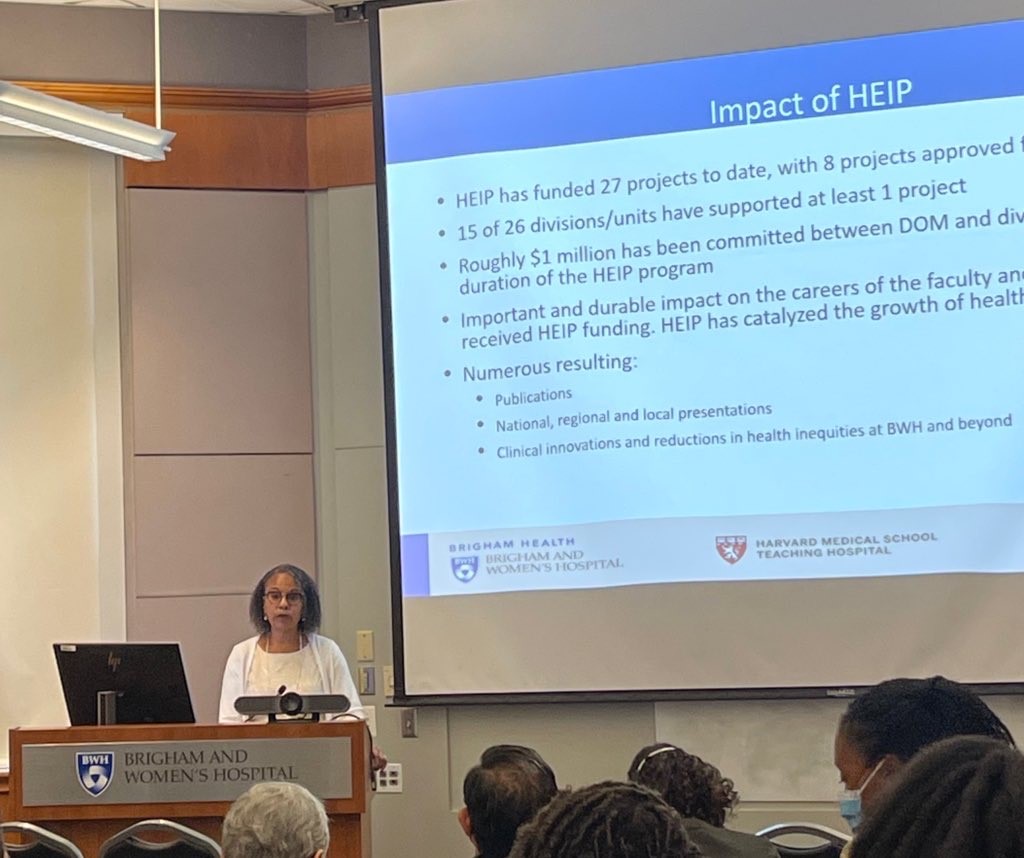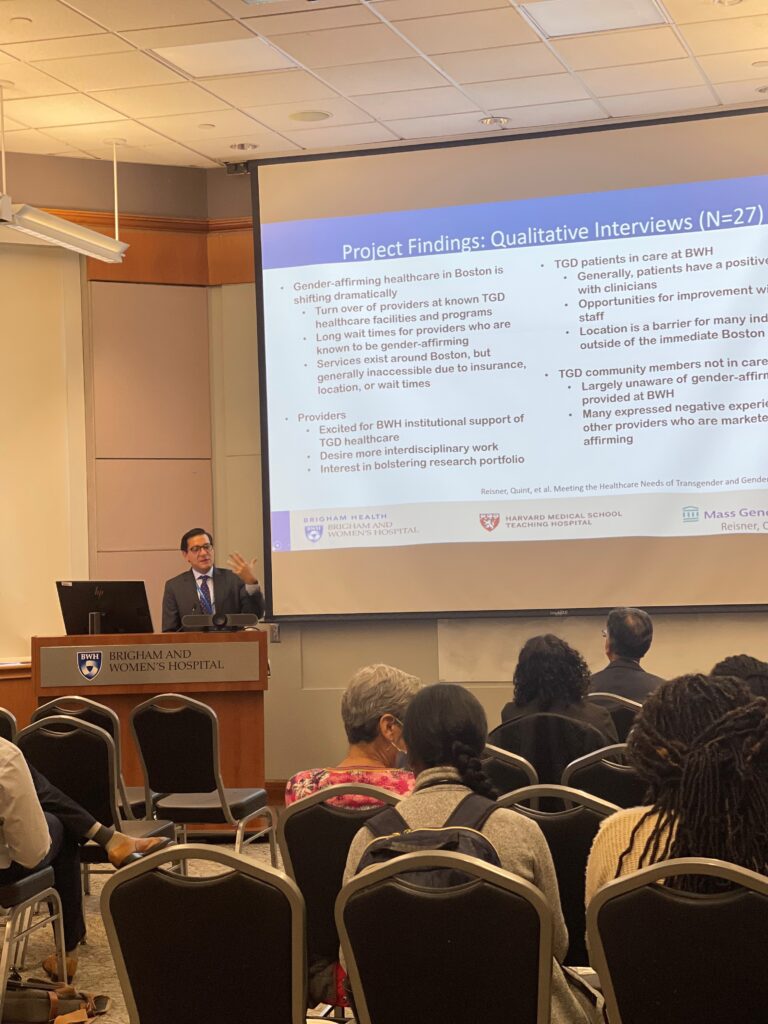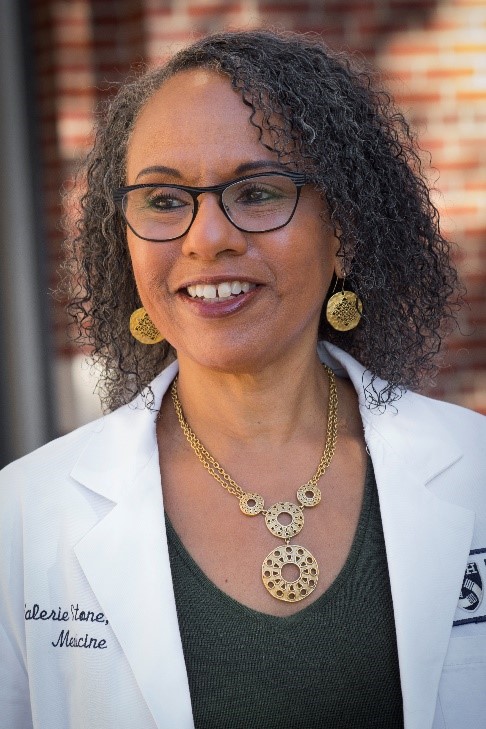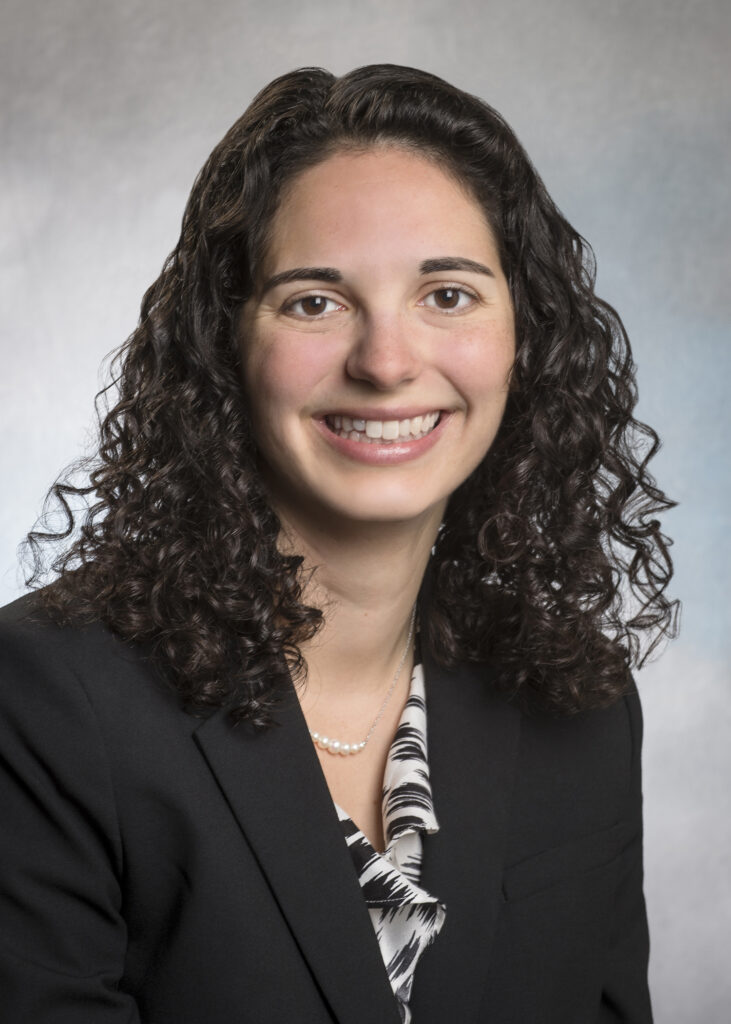Health Equity Initiatives
Overview
The vision of the DOM Health Equity Initiative, which was established in 2017, is to advance the department’s commitment to health equity by engaging key stakeholders within and outside the department in a structural analysis to address health inequities in our department and community, which will inform and influence hospital-level strategy. This initiative is led by Dr. Stone and Dr. Candace Feldman.
The goals of the initiative are to develop, implement, and evaluate multiple funded equity projects within the DOM, to further advance scholarship related to equity, and to increase commitment to health equity action among its members and DOM stakeholders. Subcommittees include Research, Education, and Operations related to grant-funded projects.
Goals and Effects
| Primary Goals | Halo Effects |
|---|---|
| Goal 1: Engagement Promote faculty/trainee/staff awareness and engagement and action on key equity issues across DOM, beyond current core membership | -Build community among faculty and trainees. -Trainees as health equity leaders -Shared sense of possibility -Replicable models which could enhance recruitment in training programs beyond DOM |
| Goal 2: Programmatic Develop, implement, and evaluate multiple funded equity projects within DOM | -Generation of new initiatives -National leadership, partnership, visibility, and sharing best practices |
| Goal 3: Scholarship Advance scholarship in both traditional and alternative venues (i.e., community-based scholarship) | -Research and publications -Engagement and collaboration across departments and institutionally |


Health Equity Advisory Council
The Health Equity Advisory Council serves as an oversight body of DOM Health Equity activities. The membership reflects and range of roles and functions within DOM and collectively the Council advises on program choices and strategy. The Council evolved from the former DOM Health Equity committee recognizing that there was a great deal of interest in health equity engagement but that a committee was not the right structure to accommodate all that interest. As a result, the Committee leadership developed the Advisory Council and concurrently a Quarterly Forum structure meant to be more inclusive of many voices and interests in DOM.
Health Equity Innovation Pilot
The Department of Medicine established the Health Equity Innovation Pilot (HEIP) in 2019 to offer grants to support innovative pilot studies that identify and address inequities in patient care and outcomes.
Proposals must identify and address inequities (e.g. race, ethnicity, age, disability, sexual orientation, gender identity) with priority given to projects that develop interventions to address the identified inequities and that include a formal role for medical students, residents, or fellows.
Awards provide up to $20,000 total cost from the DOM Health Equity Initiative with an expected matching contribution from the project leader’s DOM Division. This creates a total award of up to $40,000. All awards are for a one-year period.
HEIP Projects for Year 6 (2024-25)
HEIP Projects for Year 5 (2023 – 24)
| Project Leader(s) | Division(s) | Title |
|---|---|---|
| Nasrien Ibrahim, MD, MPH and Tracy Makuvire, MD | Cardiovascular Medicine | Assessing Barriers to Left Ventricular Assist Devices and Heart Transplantation Access |
| Sogol Javaheri, MD, MPH | Sleep and Circadian Disorders | Sleep matters: Equity in distribution of PAP therapy and patient outcomes |
| Nadine Palermo, DO | Endocrinology, Diabetes, and Hypertension | Breaking Down Barriers in the Initiation of Continuous Glucose Monitoring: Implementation of a Diabetes Technology Transitions of Care Pathway |
| Sandeep Prabhu, MD | Primary Care | Primary Care Innovation to Reduce Racial and Ethnic Disparities in Hypertension Control among Black and Hispanic Patients at BWH |
| Benjamin Rome, MD, MPH | Pharmacoepidemiology and Pharmacoeconomics | Advancing Pharmacoequity Research at Brigham and Women’s Hospital and Beyond |
Team
Vice Chair

Valerie Stone, MD, MPH
Vice Chair for Diversity, Equity and Inclusion
Dr. Stone is Vice Chair for Diversity, Equity, and Inclusion of the Department of Medicine. In addition, she is the Director of Health Equity Initiatives for the Department of Medicine. She is a general internist and HIV focused infectious disease specialist and she sees patients in the Phyllis Jen Center for Primary Care where she also precepts residents. On the inpatient side, she teaches on the ITU. Her research and scholarly writing focuses on health equity, primarily in HIV care, as well as diversity and inclusion in health care, and healthcare leadership. With Dr. Bisola Ojikutu, she is the co-editor of the textbook HIV in U.S. Communities of Color, published in its second edition in 2021. She was for many years a residency program director, so innovations in residency training remains one of her passions and one of her additional areas of scholarship. Dr. Stone is the recipient of numerous awards, including most recently the 2020 W. Lester Henry Award for Advancing Diversity from the American College of Physicians (ACP) and the 2021 and 2024 Harold Amos Award for Advancing Diversity from Harvard Medical School.
Administrative Leadership

Candace Feldman, MD, MPH, ScD
Assistant Professor of Medicine
Candace Feldman, MD, MPH, ScD is an Assistant Professor of Medicine at Brigham and Women’s Hospital and Harvard Medical School in the Division of Rheumatology, Inflammation and Immunity. She received her MD from the Yale School of Medicine, her MPH from Johns Hopkins Bloomberg School of Public Health and her ScD in Social and Behavioral Sciences from the Harvard T.H. Chan School of Public Health. She completed both her residency and fellowship at Brigham and Women’s Hospital. Clinically, she is a practicing rheumatologist with a specific focus on the care of patients with lupus as well as patients with complex medical and social needs. Her research focuses on racial, ethnic and socioeconomic health disparities in rheumatic diseases and intervention design to reduce disparities in avoidable outcomes. She was awarded the Mary Betty Stevens Young Investigator Prize by the Lupus Foundation of America, she serves on the Medical and Scientific Advisory Board of the Lupus Foundation of America, she is an Associate Editor at Lupus Science & Medicine and ACR Open Rheumatology, and on the Editorial Board of Arthritis Care & Research. She is the Co-Director of Health Equity Initiatives for the BWH Department of Medicine and leads Diversity, Equity and Inclusion Efforts for the Division of Rheumatology. Her current research is supported by grants from the NIH, the Bristol Myers Squibb Foundation and the Arthritis Foundation to study social determinants of health and equity-related issues in rheumatology and musculoskeletal diseases.

Theresa Oduol
Program Manager
